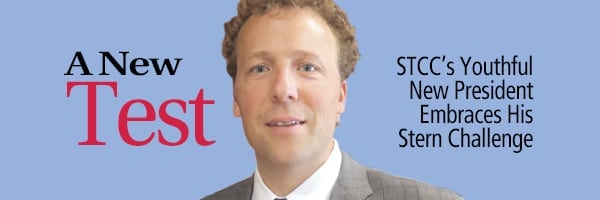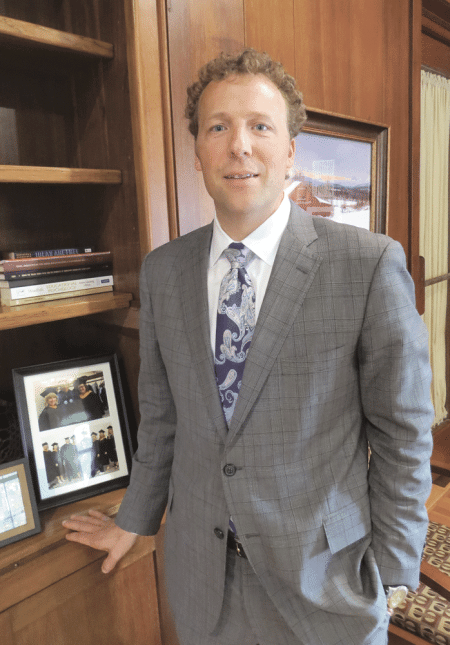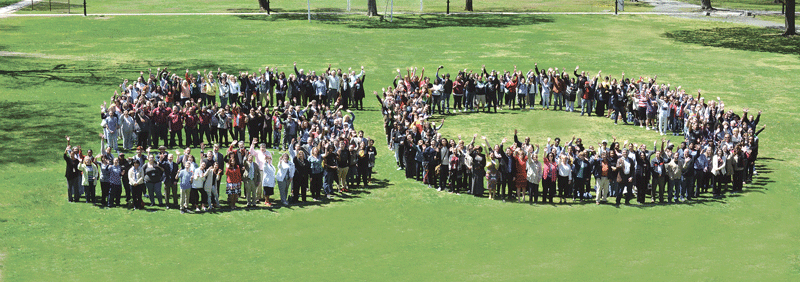
STCC’s Youthful New President Embraces His Stern Challenge
A New Test

John Cook
John Cook, who only recently became ineligible for BusinessWest’s Forty Under 40 program, took the reins at Springfield Technical Community College last month. Beyond youth — he’s not that much older than many students on this historic campus — he brings energy and a leadership style grounded in being a good listener.
As one passes through the ornate main entrance to Springfield Technical Community College, to the right is a small parking lot with a few reserved spaces. John Cook’s name is on one of them.
Well, not literally, but there is certainly a spot set aside for the president of the institution, a title Cook assumed just a few weeks ago. But he has made up his mind that he won’t be using it.
Instead, he might, like some of the college’s students themselves, try to find a spot reasonably far up the steep Pearl Street hill, several hundred yards away from that choice space, and walk through the campus to the main administration building.
He fully understands that this is a symbolic gesture, and one that certainly won’t impact the school’s persistent parking issue/challenge/problem — whatever one chooses to call it — in any significant way.
But he nonetheless considers it an important gesture because it indicates how he intends to manage — by listening closely and responding to what he hears. Far more meaningful answers to the parking situation will eventually become reality, he told BusinessWest, and in the meantime, he intends to be part of the solution is some small way — and also do some more listening while getting from Pearl Street, or wherever he finds a spot, to Garvey Hall.
“During the interview process, people asked about my style, my approach, and for me that’s a very difficult question,” he said while answering essentially the same question when put to him by BusinessWest. “Because for me, a lot of that approach is demonstrating appreciation for others and being a good listener. And it’s hard when you’re asked the question and are asked to respond, because what I really want to do is go around and ask questions of other people and give them a chance to be heard.”
The young Cook — he only recently became ineligible for BusinessWest’s Forty Under 40 program — has been doing plenty of listening for the past six months or so, through that interview process and then during his first few weeks on the job, and he’s intent on continuing that habit.
In fact, he has already put in motion some plans to open the lines of communication between himself and a host of constituencies — and keep them open. One involves blocking off time each week for open office hours — they started last week — while the other entails scheduling what he calls ‘town-meeting’ sessions.
The former, as the name implies, is time when his office door is open, literally and figuratively, to anyone who wants to go through it. That includes faculty, staff, students, and “the community,” he said, adding that he’ll make himself available from noon to 1, but also in the early evening (5:15-6:15) for those who would be on campus those hours.

From left, John Cook, state Sen. Eric Lesser, and STCC trustee Eric Hagopian, president of the Mass. Center for Advanced Design & Manufacturing, tour ‘Building 19,’ the future home of STCC’s Learning Commons.
As for the town meetings, these will involve the entire college community, he explained, and will feature an open, interactive format, one where he will share the microphone and welcome input.
“Rather than having me stand and deliver for a period of time,” he explained, “we’ll have our vice presidents up there giving updates on critical projects, and we’re going to take questions.”
Cook, most recently the vice president of Academic Affairs at Manchester (N.H.) Community College (MCC), takes the helm in Springfield during a milestone moment in the school’s history — a year-long 50th anniversary celebration. And while acknowledging that this might be a good time to look inward and set new goals, he said this occasion is better suited for reaffirming established goals and recommitting the institution to its simple, but at the same time complex, mission statement: ‘STCC supports students as they transform their lives.’
I didn’t look at many schools, and in my search, this was the only one where there seemed to be an early match, an early fit. I’m lucky that STCC and I found one another.”
Support comes in many forms, obviously, but mostly in the realm of helping students arriving at the historic campus — carved out of the Springfield Armory — see their way through to graduation or whatever goal they set when they enrolled.
For this issue and its focus on education, BusinessWest talked at length with STCC’s new president about new his career challenge and the start of the school’s proverbial next 50 years.
Setting the Scene
To say that Cook’s office on the second floor of Garvey Hall takes on a Granite State look and feel would a large understatement.
Parked against one wall is his first pair of skis (they’re wooden and considerably older than he is, although he doesn’t know exactly how old). Meanwhile, photos of snow-capped peaks adorn other walls, and a map of New Hampshire, where he had spent the sum of his professional career, hangs behind his desk.
“It provides a sense of place,” he said of this collection. “Where we went to college matters, and where we grew up matters. These are little reminders of where I’m from.”
But while his office speaks of where he’s been personally and professionally and provides that sense of place, he says he feels right at home with what he can see outside his windows, as well.
And by that, he was referring to everything from the community college atmosphere, to the similarities between MCC and STCC (more on those later), and even to the century-and-half-old buildings that give the school its unique flavor.
“I have a real healthy appreciation for historic structures,” he explained with a laugh, using those words in reference to both architecture and the high cost of upkeep. “Because I’ve helped to renovate two antique houses, both dating to the late 1700s. These buildings (at STCC), they’re oldies, but goodies; you just can’t build that kind of character any more.”
These were just some of the many motivating factors that prompted Cook to zero in on STCC as an attractive landing spot as he initiated his quest for a college president’s job — a search that began only a year ago, or just after the ink was dry on his doctorate diploma, earned at the University of New Hampshire. (A Ph.D. is considered almost a pre-requisite for presidents’ jobs today).
Elaborating, Cook said that while he wasn’t sure if his next career challenge would (or should) be a chief academic officer’s position at a larger institution or a presidency, he certainly felt qualified — and ready — for the latter.
Especially at a community college, because of work in everything from new-degree-program development to efforts to forge pathways — from high school to college, and then from MCC to four-year institutions.
Those are just some of the accomplishments listed on his resume, which notes that upon graduating from St. Lawrence University in Canton, N.Y., and then earning a master’s degree in community/social psychology at UMass Lowell, Cook started his career at Granite State College, part of New Hampshire’s public university system, as a research and evaluation coordinator in 2000. He would later become faculty coordinator at the school, and eventually serve as assistant dean of Faculty.
In 2012, he became vice president of Academic Affairs at MCC, a small community college (at least when compared to STCC) with just under 3,000 students and 55 full-time faculty.
At MMC, he took a lead role in the development of a number of new dregree and certificate programs across several academic realms, including Health Science, Life Science, Robotics, and Cyber Security. He also collaborated with a number of parties to create early-college pathway programs for high schools, encouraged faculty to embrace STEM pathways, and worked to build a culture that, as he put it, “embraces data and an analytical approach to decision-making.”
With this background, buffeted by that aforementioned doctorate, as well as some strong encouragement from MCC President Susan Huard, Cook began looking at college president positions. And as things turned out, he didn’t have to look very long or hard before coming across an opportunity that seemed worthy of that adjective ‘perfect,’ both professionally and personally (this job allows him to remain very close to his two young children from a previous marriage, who are still living in New Hampshire).
“I feel very fortunate — people who have been there, people who have been presidents of multiple institutions tell me that often, you’re looking for months, sometimes years, for the right institution,” he told BusinessWest. “I didn’t look at many schools, and in my search, this was the only one where there seemed to be an early match, an early fit. I’m lucky that STCC and I found one another.”
By that, he meant that he identified the school as the focal point of his quest for a president’s job, and the search committee, following an intense, six-month exploratory and interview process, deemed him the best candidate to take it into the next half-century, following the 12-year tenure of Ira Rubenzahl, who succeeded Andy Scibelli, who spent 21 years in the president’s office.
Those two leaders have taken the school to new and lofty heights, said Cook, adding that he considers it his responsibility to continue and build upon this legacy.
Course of Action
Looking back on the lengthy search process for STCC’s next president, Cook said he was asked a number of intriguing questions during several interviews — and, as might be expected based on what he said earlier, he had several for those on the other side of the table.

John Cook takes the helm at STCC during its 50th anniversary, a time, he said, to recommit to its message of helping students succeed.
One of them was a rather direct query about what members of the search panel were looking for in the next leader of the school. Words and phrases that came back repeatedly were ‘accessible,’ ‘approachable, ‘forward-thinking,’ and someone willing to be a “champion” for the school and community colleges in general.
He intends to be all of the above with actions that go well beyond giving up his parking space.
For starters, he noted his open office hours and planned town meetings, as well as that leadership style of listening and demonstrating appreciation.
Through such initiatives, and with such skill sets, Cook feels he’s ready and able to lead efforts to address the many challenges facing the school moving forward and outlined in a recently drafted strategic plan. They include:
• That aforementioned parking problem. It’s not exactly a recent phenomenon, in fact the challenge is in many respects as old as the school. But it remains a constant and is always a consideration with the next item on the list;
• Enrollment. It soared during the Great Recession, as it did at all area public schools, but has retreated since, for reasons ranging from a vast improvement in the economy to smaller high school graduating classes;
• The ongoing restoration and renovation of the structure known as Building 19, a huge, 700-foot-long former storage house for the Armory that is being converted into a campus center that will host a wide array of offices and programs. Conceived and nurtured by Rubenzahl, the project will reorient the campus and shift most activity from the main administration building to ’19,’ as it’s called, on the north side of the campus;
• Continuing the collaborative efforts between STCC and Holyoke Community College, forged by Rubenzah and his counterpart at HCC (now also retired) Bill Messner. Formerly, and in many ways still, rivals (at least when it comes to enrollment and athletics), the schools have come together on many projects in recent years, especially the TWO (Training and Workforce Options) program that has helped area companies develop talented workers and close a recognized skills gap. Cook said it will be one of his priorities to continue the collaborative efforts and initiate new ones.
But the broader, overriding assignment will be to certainly carry out the school’s mission and help students succeed, he said, adding there are many elements to this equation.
Indeed, the college needs to not only help students with academics and put them on a track to success, but keep them on it.
“Some of it, in fact a big part of it, is life — how do we help students with those issues, not just education,” Cook explained, noting that many STCC students cannot be described with that industry term ‘traditional.’ “They’re working a lot, they’re raising families, there’s transportation issues; all those things influence our students, regardless of their age.”
Cook said that the recently announced Commonwealth Commitment program would certainly help with this assignment.
The initiative incentivizes individuals (through rebates on tuition and fees and a $30,000 cap on the cost of a four-year degree) to enter a community college, graduate in two and half years or less, move on to one of the state universities or UMass campuses, and wrap up a baccalaureate degree in no more than four and a half years.
“This really helps incentivize students to not just go part time,” he explained. “If you can find the wherewithal to go full time, you’re going to earn that associate’s in two years, tuition has been frozen for you, and that really helps see them through to that bachelor’s.”
Thus, the program also further escalates the role community colleges are playing in preparing individuals for today’s technology-based economy, he noted, adding that these institutions are ready for, and well-suited for, this heighted responsibility.
“One of the things community colleges, and especially STCC, have is the ability to respond quickly and nimbly to changing needs within the community,” he explained. “If a community college partner says ‘we have a need,’ we can help with that assessment, and sometimes, in a short time, have a training program ready for them.”
Hot Spot
Returning to the matter of where his car will reside, Cook acknowledged, again, that his gesture was not intended to solve the problem.
“We’ve got creative an innovative ways to put that spot to better use,” he explained. “It’s one spot for our hundreds of staff and faculty and thousands, but it’s not much for me to park on Pearl Street and walk on over.”
By doing so, he gets to demonstrate his sensitivity to the issue, and, more importantly, do something he likes much more than answering questions: Asking them.
George O’Brien can be reached at [email protected]





